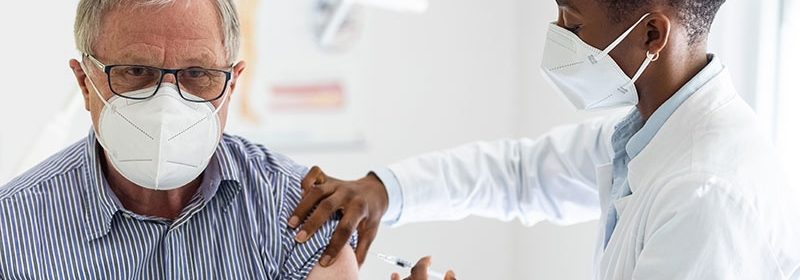CDC Endorses COVID Boosters Targeting Omicron Variants

Centers for Disease Control and Prevention (CDC) Director Rochelle Walensky, MD, MPH, has endorsed new booster vaccines designed to target both the newer Omicron variants along with the original variants of SARS-CoV-2, a step that may aid a goal of a widespread immunization campaign before winter arrives in the United States.
Earlier today the Advisory Committee on Immunization Practices (ACIP) of the CDC voted 13-1 on two separate questions.
One voting question sought ACIP’s backing for using a single dose of a new bivalent version of the Pfizer-BioNTech COVID vaccines for people age 12 years and older. The second question addressed a single dose of the bivalent Moderna vaccine for people age 18 years and older.
The federal government is seeking to speed the use of revamped COVID shots, which the US Food and Drug Administration (FDA) on Wednesday cleared for use in the US. The FDA did this by expanding the emergency use authorization (EUA) for these products, also called “updated boosters.”
Both products contain two mRNA components of the virus that causes COVID-19, one targeting the original strain of SARS-CoV-2 and the other targeting the BA.4 and BA.5 lineages of the Omicron variant, the FDA said.
In essence, the FDA provided expanded clearance for these new products relying heavily on results of certain blood tests (antibody titers) suggesting an immune response from the new products, plus the accumulated safety record for the older and newer versions of the shots. Also factored in was the clinical evidence to date for the older shots and results from studies done in mice.
ACIP member Pablo Sanchez, MD, of The Ohio State University, cast the sole negative vote on each question.
“It’s a new vaccine, it’s a new platform. There’s a lot of hesitancy already. We need the human data,” Sanchez said.
Still, he said the newer versions of the vaccine would prove safe.
“I personally am in the age group where I’m at high risk, and I’m almost sure that I will receive it,” Sanchez said. “I just feel that this was a bit premature, and I wish that we had seen that data. Having said that, I am comfortable that the vaccine will likely be safe like the others.”
Concerns About Evidence
Sanchez was not alone in raising concerns about backing new COVID shots for which there is no direct clinical evidence.
ACIP member Sarah Long, MD, of Drexel University said during the discussion that she would “reluctantly” vote in favor of the updated vaccines. She said she believes they will have the potential to reduce hospitalizations and even deaths, even with questions remaining about the data.
Long joined other ACIP members in citing the long-standing approach to updating flu vaccines as a model. In an attempt to keep ahead of new influenza strains, companies tweak their FDA-approved vaccines.
There is not much clinical information available about these revised products, Long said. She compared it to remodeling an existing home.
“It is the same scaffolding, part of the same roof, we’re just putting in some dormers and windows,” with the revisions to the flu vaccine, she said.
Earlier in the day, ACIP member Jamie Loehr, MD, of Cayuga Family Medicine in Ithaca, New York, spoke of revised annual flu shots as the model for advancing COVID shots.
“The future that we’re heading for,” he said. “So after thinking about it, I am comfortable even though we don’t have human data, and just animal data on supporting the [booster].”
There were several questions during the meeting about why the FDA had not convened a meeting of its Vaccines and Related Biological Products Advisory Committee (VRBPAC) regarding these specific bivalent vaccines.
FDA officials took the view that previous VRBPAC consideration of the topic of bivalent COVID boosters in general sufficed in terms of seeking outside feedback.
But holding a VRBPAC meeting on these specific products, the newly cleared bivalent shots, could have helped build public confidence in these medicines, said Dorit Reiss, PhD, of the University of California Hastings College of Law, during the public comment session of the meeting.
“We could wish the vaccines were more effective against infection, but they’re safe and they prevent hospitalization and death,” she said.
Vaccine Distribution Already in Motion
The Department of Health & Human Services (HHS) anticipated the backing of ACIP and the subsequent endorsement from Walensky.
On Wednesday, the Administration for Strategic Preparedness and Response began distributing “millions of doses of the updated booster to tens of thousands of sites nationwide,” wrote Jason Roos, PhD, chief operating officer for HHS Coordination Operations and Response Element, in a blog.
“People will soon be able to receive — at no charge — their updated COVID-19 booster shot containing an Omicron component,” Roos wrote. “These boosters will be available at tens of thousands of vaccination sites they’ve used previously, including local pharmacies, their physicians’ offices, and vaccine centers operated by state and local health officials.”
Kerry Dooley Young is a freelance journalist based in Miami Beach, Florida. She is the core topic leader on patient safety issues for the Association of Health Care Journalists. Follow her on Twitter at @kdooleyyoung.
For more news, follow Medscape on Facebook, Twitter, Instagram, and YouTube.
Source: Read Full Article